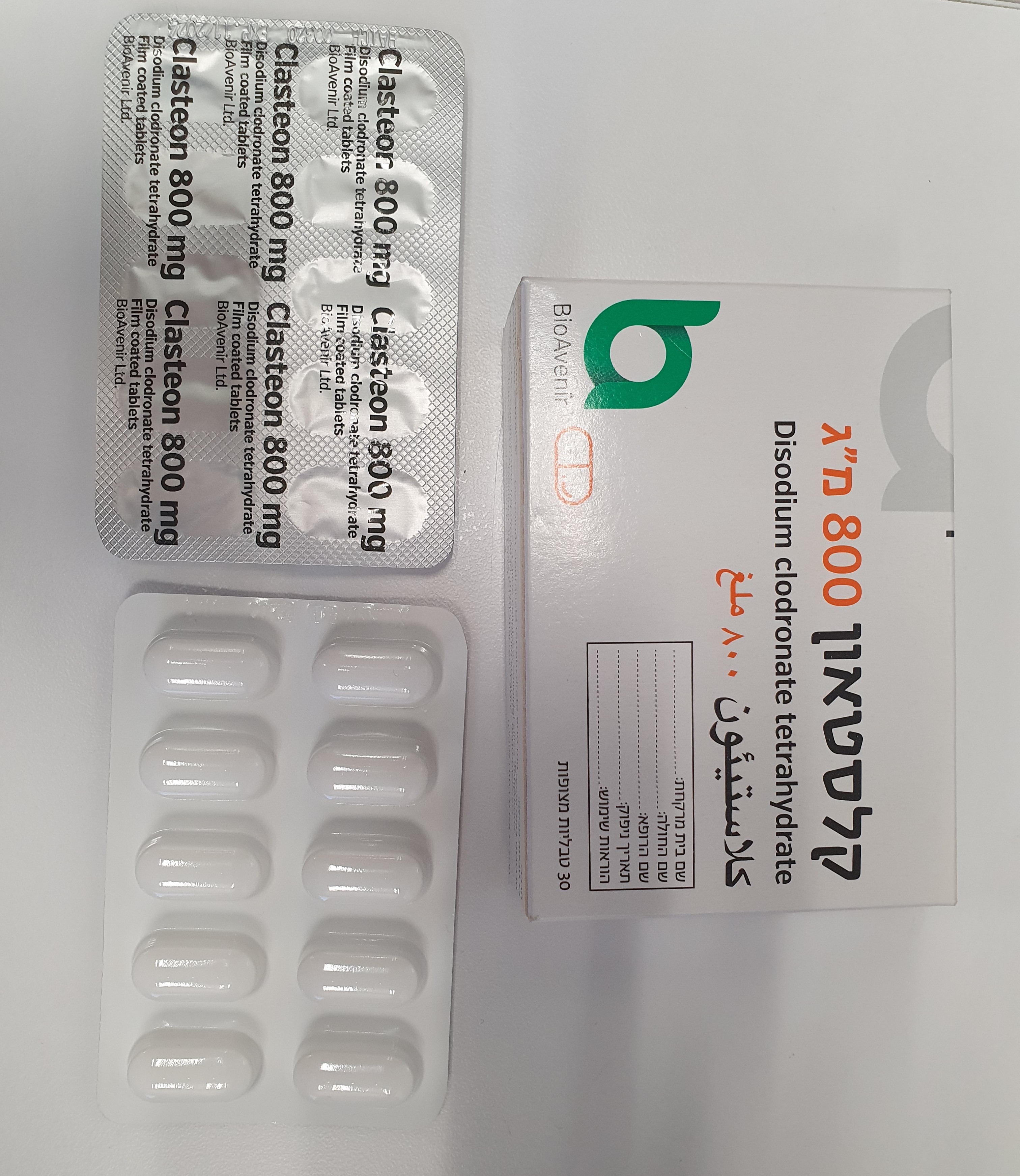Quest for the right Drug

קלסטאון 800 מ"ג CLASTEON 800 MG (CLODRONIC ACID AS DISODIUM TETRATHYDRATE)
תרופה במרשם
תרופה בסל
נרקוטיקה
ציטוטוקסיקה
צורת מתן:
פומי : PER OS
צורת מינון:
טבליות מצופות פילם : FILM COATED TABLETS
עלון לרופא
מינוניםPosology התוויות
Indications תופעות לוואי
Adverse reactions התוויות נגד
Contraindications אינטראקציות
Interactions מינון יתר
Overdose הריון/הנקה
Pregnancy & Lactation אוכלוסיות מיוחדות
Special populations תכונות פרמקולוגיות
Pharmacological properties מידע רוקחי
Pharmaceutical particulars אזהרת שימוש
Special Warning עלון לרופא
Physicians Leaflet
Posology : מינונים
4.2 Posology and method of administration Posology Clodronate is mainly eliminated via the kidneys. Therefore, adequate fluid intake must be maintained during clodronate treatment. Pediatric patients: Safety and efficacy in children have not been established. Elderly patients: There are no special dosage recommendations for the elderly. Clinical trials have included patients over 65 years and no adverse effects specific to this age group have been reported. CLASTEON® 800 mg tablets should be swallowed whole. A CLASTEON® 800 mg tablet may be divided into two to ease swallowing, but the halves have to be taken at the same time of administration. CLASTEON® 800 mg tablets must not be crushed or dissolvedbefore intake. A daily dose of 1600 mg should be taken as a single dose. When higher dailydoses are used, the part of the dose exceeding 1600 mg should be taken separately (as a second dose) as recommended below. The single daily dose and the first dose of two, should preferably be taken in the morning on an empty stomach together with a glass of water. The patient should then refrain from eating, drinking (other than plain water), and taking any other oral drugs for one hour. When twice daily dosing is used the first dose should be taken as recommended above. The second dose should be taken between meals, more than two hours after and one hour before eating, drinking (other thanplain water), or taking any other drugs. Clodronate should in no case be taken with drinks, food or drugs containingcalcium or other divalent cations because they impair the absorption of clodronate. Adult patients with normal renal function: Treatment of hypercalcemia due to malignancy: Intravenous clodronate treatment is recommended for the start of treatment in hypercalcemia. Subsequently, an oral dosage of 1600–3200 mg clodronate daily may be used. However, if oral therapy is used, a high starting dose of 2400 -3200 mg should be used and, depending on the individual response, this can be reduced gradually to 1600 mg daily. Treatment of osteolysis due to malignancy: When oral therapy is used to treat increased bone resorption without hypercalcemia the recommended starting dose is 1600 mg daily. If clinicallynecessary, the dose may be increased, but is not recommended to exceed 3200 mg daily. Patients with renal failure: Clodronate is eliminated mainly via the kidneys. Therefore, it should be usedwith caution in patients with renal failure; Daily doses exceeding 1600 mg should not be used continuously. It is recommended that the clodronate dosage be reduced as follows: Degree of renal failure Creatinine Clearance Dose (ml/min) Mild 50-80 1600 mg /daily (no dose reduction recommended) Moderate 30-<50 1200 mg /daily Severe* 10-<30 800 mg /daily *) No pharmacokinetic data are available in patients with renal failure withcreatinine clearance below 10 ml/min for oral clodronate. CLASTEON® 800 mg tablets are contraindicated in patients with severe renal failure (creatinine clearance below 10ml/min),

שימוש לפי פנקס קופ''ח כללית 1994
לא צוין
תאריך הכללה מקורי בסל
לא צוין
הגבלות
לא צוין
מידע נוסף
